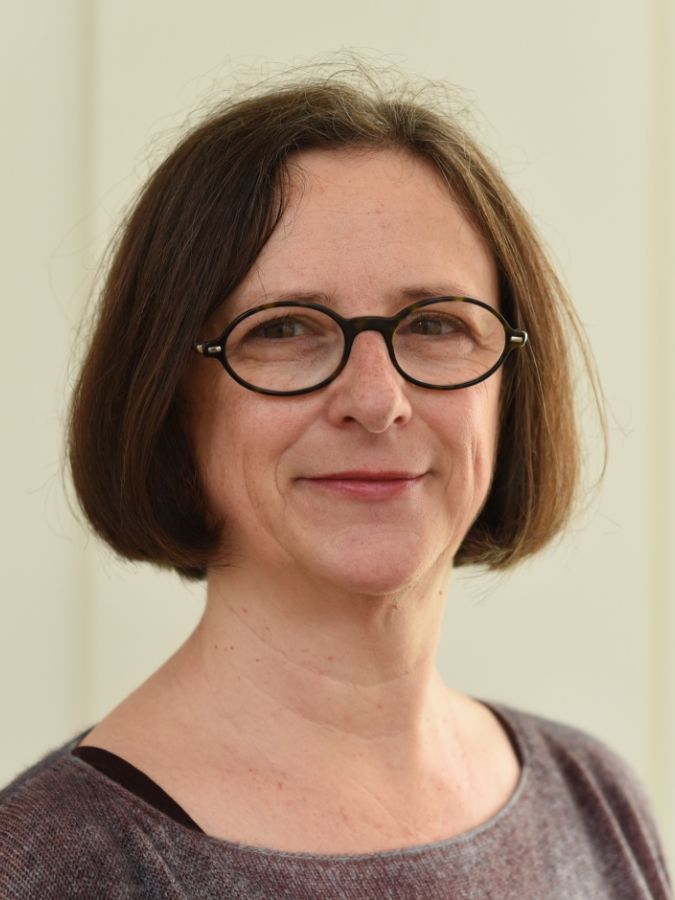Nadja Grbić
Nadja Grbić studied linguistics and Slavic studies. Her PhD focused on sociolinguistics. During her studies, she was involved in a research project on multilingualism in early childhood. In 1989, she joined the Department of Translation Studies at the University of Graz as a research assistant, and was appointed to the post of senior researcher in 1994. To date, she has conducted twelve national and international research and development projects, including work on sign language interpreting and sign language lexicography, with a financial volume amounting to 1,6 million Euros. She also developed and implemented the first full-time study program for sign language interpreters at a translation studies department at a time when such programs were generally situated in linguistics, social work or health science departments.

In 2017, she was appointed Associate Professor of Translation Studies having completed her postdoctoral thesis (Habilitation) on the history of signed language interpreting in Austria and the construction of a profession, proposing a new professionalization model and typology of interpreting events, including professional as well as non-professional practices. In her research, she has focused on issues pertaining to translation and gender; the construction of south-east European literature via translation in Romanticism and post-war Yugoslavia; the concept of interpreting quality; strategies of boundary work with regard to signed language interpreting, community interpreting, and professional vs. non-professional interpreting; and the history of interpreting and translation studies, including scientometrics, which led her to her recent interest in the constructive nature of the translation/interpreting concept in various disciplines. Until 2012, she was reviews editor of the journal Translation Studies, edited by Kate Sturge and Michaela Wolf and published by Routledge. She is also associate editor of the Routledge Encyclopedia of Interpreting Studies. Nadja Grbić has also translated literature from Bosnian, Croatian and Serbian into German. She is currently deputy head of the Department of Translation Studies at the University of Graz.
Keynote speech:
“The rigid, the fuzzy, and the flexible”[1]
Perceptions of the interpreter (not only) in the digital age
In recent times, homo faber has been particularly challenged by globalization and rapid advances in digitalization and artificial intelligence. The consequences of the technology-induced “translation revolution” (Cronin 2013) are far-reaching and the covid-19 pandemic has taken us even further down this road. Although translation and interpreting have become the “key infrastructure for global communication” (Bielsa 2005:139), social conditions surrounding these tasks are often obscured and the human aspect is readily neglected (ibid.).
However, technological change also opens up new opportunities for our discipline to work proactively towards bringing the human factor of interpreting to the fore. In my presentation, I will use “human” as a prism and begin by looking at the history of interpreting studies to show how we have fostered the “abstract anonymity” (Pym 1998) of the interpreter. I will demonstrate how individual interpreters have been reduced to a set of typical characteristics of the profession through a rigid concept of ‘profession’, depicting ideal practitioners deprived of individuality and emotionality. In response, I will try to explore alternative epistemological and methodological ways which might help us to better understand the experiences lived by interpreters as active subjects in different spatio-temporal contexts. These include an unbiased view of the heterogeneity and hybridity of interpreting activities, an openness to take lesser researched ‘human’ concepts into consideration, such as empathy, understanding, or trust, as integral parts of the interpreter’s agency, as well as focusing more on relations between agents and negotiation processes in the multiverse of interpreting phenomena.
References
Bielsa, Esperança (2005) Globalisation and Translation: A Theoretical Approach. Language and Intercultural Communication 5:2, 131–144.
Cronin, Michael (2013) Translation in the Digital Age. London & New York: Routledge.
Pym, Anthony (1998) Method in Translation History. Manchester: St. Jerome.
Zerubavel, Eviatar (1995) The Rigid, the Fuzzy, and the Flexible: Notes on the Mental Sculpting of Academic Identity. Social Research 62:4, 1093–1106.
[1] Zerubavel (1995)
